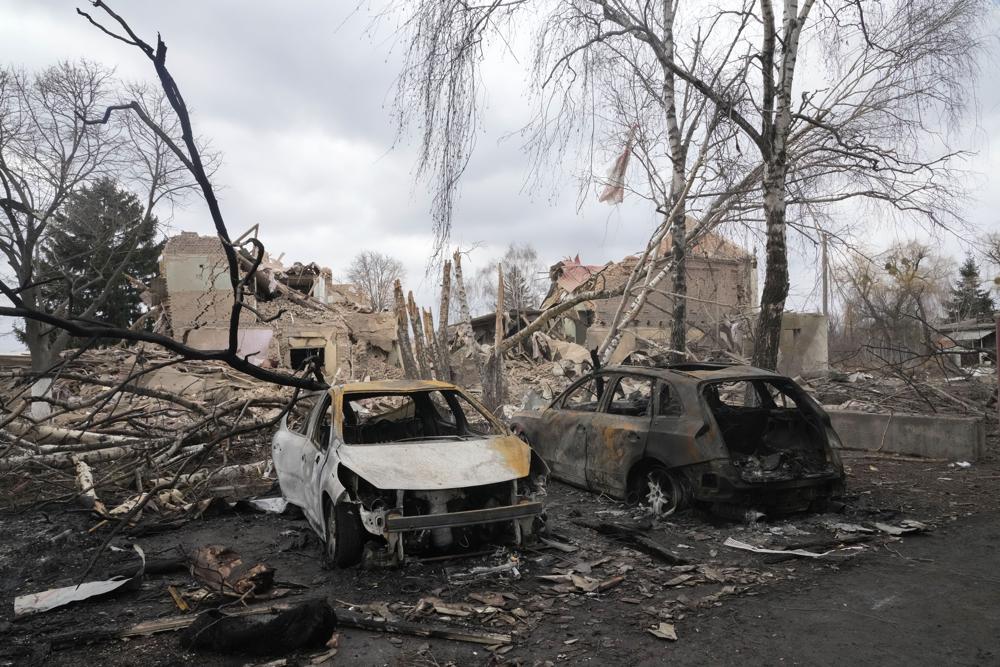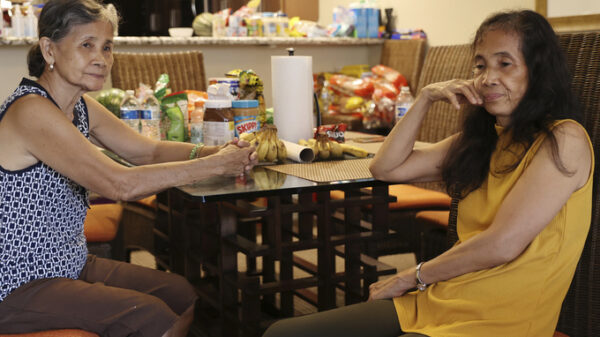Gutted cars following a night air raid in the village of Bushiv, 40 kilometers west of Kyiv, Ukraine, Friday, March 4, 2022. Russia’s war on Ukraine is now in its ninth day and Russian forces have shelled Europe’s largest nuclear power plant, sparking a fire there that was extinguished overnight. (AP Photo/Efrem Lukatsky)
The latest developments on the Russia-Ukraine war:
SAO PAULO — Brazil’s government said on Friday it will issue temporary humanitarian visas and residency permits for Ukrainian nationals and other individuals who have been affected or displaced by the conflict with Russia.
The visas will be valid for 180 days and arriving Ukrainians can apply for residency permits lasting two years, according to the text published in the nation’s official gazette. Brazil will require, among other documents, a certificate attesting to the person’s clean criminal record.
Brazilian media have reported that the country has Latin America’s biggest population of Ukrainians and their descendants, ranging between 500,000 and 600,000, according to an estimate from Ukraine’s embassy.
The administration of President Jair Bolsonaro has been ambivalent about the conflict. Bolsonaro himself expressed solidarity with his Russian counterpart Vladimir Putin on a recent visit, and has said Brazil will retain a neutral stance in the conflict. At the same time, Brazil voted to condemn the invasion in the meeting of the United Nations’ Security Council.
LONDON — London’s Metropolitan Police force says its War Crimes Team is helping gather evidence for an International Criminal Court investigation into the Ukraine invasion.
Britain’s biggest police force appealed for people in Britain to come forward if they had “direct evidence of war crimes in Ukraine” between Nov. 21, 2013 and the present.
The 2013 date marks the start of protests against Ukraine’s Russia-leaning government and for closer ties with Europe. The following year, Russia annexed Crimea and intervened to support separatists in eastern Ukraine. Last week, Russian troops invaded the country en masse.
Commander Richard Smith, head of Metropolitan Police Counterterrorism Command, which includes the War Crimes Team, said evidence might include “direct messages, images or videos that friends or relatives here in the U.K. have been sent by those in Ukraine. Or it could be somebody who was previously in Ukraine and who may have witnessed or even been a victim of a war crime and has since travelled to the U.K.”
The force said evidence could be shared with the Hague-based court, which is investigating possible war crimes and crimes against humanity in Ukraine.
GENEVA — In the first of what is likely to be its daily counts, the U.N.-affiliated International Organization for Migration said 1.25 million people had left Ukraine between the start of the invasion and 09:30 a.m. on Friday. It cited government ministries for its information.
Those figures were slightly higher than a count from UNHCR, the U.N. refugee agency, which has so far estimated that 1.2 million people have left the country since the Russian invasion began on Feb. 24. A spokesman from IOM said its figures were slightly more up-to-date.
IOM, which focuses on all types of migrants — not just refugees — also provided new details about where the people fleeing were from: It reported that 78,800 “third-country nationals” — not Ukrainians — from 138 countries had left the country.
IOM said: “We have credible and verified information from partners and humanitarians present on borders with neighboring countries have documented discrimination against several third country nationals arriving in neighboring countries. They have also documented act of xenophobia based on people’s race, ethnicity and nationality.”
“Third country nationals reported having faced discrimination on their journey. States need to investigate and act immediately to ensure that everyone fleeing the conflict is treated humanely, and provided access to territory and protection,” IOM said.
LONDON — The BBC says it is temporarily suspending the work of all its journalists in Russia after the country’s lawmakers approved legislation criminalizing reporting of the war in Ukraine that differs from the government line.
Tim Davie, director-general of the British broadcaster, said the legislation “appears to criminalize the process of independent journalism.” He said the corporation was halting newsgathering work by its journalists and support staff in Russia “while we assess the full implications of this unwelcome development.”
“The safety of our staff is paramount and we are not prepared to expose them to the risk of criminal prosecution simply for doing their jobs,” he said.
Davie said the BBC’s Russian-language news service would continue to operate from outside Russia.
The Russian parliament voted unanimously Friday to approve a draft law criminalizing the intentional spreading of what Russia deems to be “fake” reports. It could be signed by President Vladimir Putin and take effect as soon as Saturday.
MOSCOW — A Russian lawmaker has spoken out about what she says are heavy losses being suffered by some military units fighting in Ukraine.
Lyudmila Narusova, a member of Russia’s upper house of parliament, the Federation Council, said during Friday’s livestreamed proceedings that she knew of one company which was meant to be 100 strong but “only four were left alive” when the unit was withdrawn.
Narusova, the widow of President Vladimir Putin’s former political mentor Anatoly Sobchak, did not present evidence for her claims and said the Defense Ministry had refused her request to confirm the reported casualties.
Russia said Wednesday 498 of its troops had been killed in Ukraine and has not updated that number since. Ukraine claims that the true number of Russian casualties is far higher.
LONDON — A Western official says a huge Russian military convoy advancing on Kyiv has made little progress for several days.
The official said the convoy, which has been estimated at up to 40 miles (64 kilometers) long, had become a huge traffic jam that included damaged or destroyed vehicles.
The official, who spoke on condition of anonymity to discuss intelligence, said the convoy had been attacked from the air by the Ukrainians, but that Ukraine’s ability to do so was limited.
The official assessed that Ukrainian forces remain in control of much of the country’s territory but that Russia holds the cities of Kherson, Melitopol and Berdiansk in the south.
Multiple Western officials have said Russia’s invasion of Ukraine has advanced more slowly than planned, with Russian forces meeting stiff Ukrainian resistance and encountering myriad logistical problems.
Russian President Vladmir Putin said Thursday that what he calls a “special military operation” was on course to meet its goals.
Associated Press Writer Jill Lawless in London contributed to this report.
SARAJEVO, Bosnia Herzegovina — Additional troops from four European Union nations started arriving in Bosnia Friday to reinforce the EU-led peacekeeping force in the Balkan country which has never fully recovered from its brutal 1992-95 war.
All four companies of the reserve forces from Austria, Bulgaria, Romania and Slovakia will arrive at the European Union Force (EUFOR) base outside Sarajevo to reinforce its 600-strong contingent already stationed in the country. The new deployments will total 500 troops.
EUFOR announced the deployment of additional forces a day after Russian president Vladimir Putin launched his invasion of Ukraine on Feb. 24.
The force described the step as a precautionary measure to prevent the deterioration of the security situation internationally from spreading to Bosnia.
A staunchly pro-Russian Bosnian Serb leader, Milorad Dodik, has for years advocated the separation of the semi-autonomous Bosnian Serb mini-state from the rest of the multi-ethnic country.
Last winter, with tacit support from Moscow, Dodik intensified his secessionist campaign, pledging to form an exclusively Serb army, judiciary and tax system.
The European Union pledged earlier in February to limit financial assistance and possibly impose sanctions in Bosnia to prevent unravelling of the US-brokered peace agreement that ended the Balkan country’s brutal interethnic war in the 1990s.
MOSCOW — President Vladimir Putin says Russia is ready for talks with Ukraine but insisted that it must meet Moscow’s demands.
Putin told German Chancellor Olaf Scholz that Ukraine must agree to demilitarize, accept Moscow’s sovereignty over Crimea and surrender territory to Russia-backed rebels in the east, the Kremlin said in its readout of Friday’s call.
Russia annexed Ukraine’s Crimean Peninsula in 2014 following the ouster of the country’s former Moscow-friendly leaders and cast its support behind the rebels in eastern Ukraine.
Putin recognized the separatist “people’s republics” as independent states just before he launched an invasion of Ukraine on Feb. 24, citing their plea for military assistance.
Russian and Ukrainian negotiators on Thursday held the second of two rounds of talks, reaching a tentative agreement on setting up safe corridors to allow civilians to leave besieged Ukrainian cities and the delivery of humanitarian supplies. They also agreed to keep talking on ways to negotiate a settlement, but Putin’s tough demands make prospects for a compromise look dim.
Ukrainian negotiators said the parties may conduct another round of talks over the weekend.
KYIV, Ukraine — A top Ukrainian cybersecurity official says a volunteer army of hundreds of hackers enlisted to fight Russia in cyberspace is only attacking what it deems military targets, prioritizing government services including the financial sector, Kremlin-controlled media and railways.
Victor Zhora, deputy chair of the state special communications service, also said Friday that there had been about 10 hostile hijackings of local government websites in Ukraine to spread false text propaganda saying his government had capitulated. He said most of Ukraine’s telecommunications and internet were fully operational.
Zhora told reporters in a teleconference that presumed Russian hackers continued to try to spread destructive malware in targeted email attacks on Ukrainian officials and – in what he considers a new tactic – trying to infect the devices of individual citizens.
Zhora said one job of civilian volunteer hackers is to try to obtain intelligence that can be used to attack Russian military systems. He said volunteers from Ukraine’s IT sector are also addressing the Russian people directly with phone calls, emails and text messages. That includes sending videos and pictures of dead Russians soldiers.
KYIV, Ukraine — As occasional explosions sounded on the fringes of Kyiv, a young couple held their wedding ceremony on Friday.
Dmytro Shybalov and Anna Panasyk smiled and blushed in shy delight at the civil registry office where they married. The day was an eerie echo of when they fell in love in 2015 in Donetsk amid the fighting between separatists and Ukrainian forces that was a precursor to the countrywide war.
“It’s 2022 and the situation hasn’t changed. It’s scary to think what will happen when our children will be born,” Shybalov said.
MADRID — Spain’s Teatro Real, one of Europe’s major opera houses, is canceling a set of upcoming performances by Russia’s famed Bolshoi Ballet because of the war the country is waging on Ukraine.
In a statement on Friday, the management of the Madrid-based opera house said that the Russian state-funded company’s mid-May performances of Ludwig Minkus’ La Bayadere won’t go ahead “due to the war unleashed by Russia in Ukraine, which is causing a serious global crisis and a painful humanitarian emergency.”
The theatre also stated that Bolshoi Ballet Director Vladimir Urin was among a group of Russian artists who signed a petition against the war.
On Feb. 27, during the final performance at Teatro Real of “Twilight of the Gods,” artists on stage wrapped the corpse of the protagonist, Siegried, in the Ukrainian flag. The action, as part of an opera that “places man in front of his own path to self-destruction,” was meant to be “a symbolic act of homage to the victims of the war,” Teatro Real said at the time.
LONDON — One of Britain’s biggest supermarket chains is changing the spelling of “chicken Kiev” to “chicken Kyiv” out of solidarity with Ukraine.
Sainsbury’s is the first major U.K. grocer to heed calls for the popular garlicky poultry dish to carry the Ukrainian spelling of the country’s capital city.
Sainsbury’s, Britain’s second-largest supermarket chain, also said it was halting sales of the only purely Russian products on its shelves: Russian Standard vodka and Karpayskiye black sunflower seeds.
The supermarket said in a statement that it wanted to “stand united with the people of Ukraine.”
GENEVA — The U.N. refugee agency reported Friday that more than 1.2 million people have left Ukraine since the fighting began.
More than 165,000 people left the country on Thursday — down slightly from Wednesday’s count and well under the nearly 200,000 on Tuesday, which amounted to the peak one-day outflow of people from Ukraine since the conflict began, according to the United Nations High Commissioner for Refugees.
Its data portal on Ukraine showed that the majority — about 650,000 — had gone to neighboring Poland, and roughly 145,000 had fled to Hungary. Another 103,000 were in Moldova and more than 90,000 in Slovakia.
UNHCR spokesperson Shabia Mantoo said “we know that the majority are women, children and the elderly,” but she was unable to provide a more specific breakdown by age or gender.
GENEVA — The U.N. human rights office, in its latest count of casualties released Friday afternoon, said it had confirmed 331 people killed and 675 people injured since the beginning of the Russian invasion.
The rights office uses strict methodology and only reports casualties it has confirmed. It believes the real figures are much higher. Ukrainian officials have presented far higher numbers.
LONDON — A union says dockers at a British port have refused to unload gas tankers from Russia, and called for tighter sanctions to prevent Russian cargoes arriving in the U.K.
The Unison union says two tankers, Boris Vilkitsky and Fedor Litke, were diverted from Europe’s largest liquefied natural gas terminal on the Isle of Grain in southeast England.
The union said the British government must close a loophole that meant the cargo could return if it was loaded onto non-Russian vessels.
Britain has banned Russia-linked ships from its ports, but the union’s head of energy, Matt Lay, said the rules “only cover the ownership and operators of vessels, not the cargo.” He said “companies are free to get around the rules by hiring ships from other countries to import Russian goods.”
British Prime Minister Boris Johnson has called for Western countries to stop buying Russian oil and gas, but it is still being bought by many countries, including the U.K.
BRUSSELS — Irish Foreign Minister Simon Coveney says the European Union may agree “early” next week on another set of sanctions against Russia over its invasion of Ukraine.
Coveney said Friday that “we in the European Union and other partners are really disgusted and outraged by what we continue to see day after day in Ukraine and Russia’s actions, which clearly are a breach of international law.”
Speaking to reporters before a meeting with his EU counterparts and U.S. Secretary of State Antony Blinken, Coveney said: “I don’t think there’s any credible argument now that war crimes aren’t being committed on a daily basis.”
He says the West must brace for no letup in the fighting in Ukraine.
“Unfortunately it looks like we are going to see more of this in the coming days and weeks,” Coveney said. “The picture looks very bleak, very dark, in terms of Russia’s intentions. And there doesn’t seem to be any willingness to discuss a cease-fire, to discuss a pulling back out of residential areas.”
COPENHAGEN, Denmark — Latvia joined Lithuania in changing the name of the street where the Russian Embassy is located in Riga to “Ukrainian Independence Street.”
The decision has been made Friday by the Riga City Council to voice support to Ukraine’s sovereignty, territorial integrity and Ukraine’s fight against the Russian invasion, the Baltic News Service reported Friday.
On Thursday, the mayor of the Lithuanian capital Vilnius said that the city will change the name of a street where the Russian diplomatic mission sits. Mayor Remigijus Simasius said a quiet alley in downtown Vilnius where the Russian embassy is located will change its name to “Heroes of Ukraine street.”
COPENHAGEN, Denmark — Danish brewer Carlsberg said Friday that it was immediately stopping new investments and exports to Russia.
The group’s CEO Cees ’t Hart said the stop also includes exports from other Carlsberg Group companies to Baltika Breweries in Russia.
“We will respect all applicable sanctions being put in place and continue to assess the situation in relation to our business in Russia,” he said in a statement to The Associated Press.
Carlsberg has 8,400 employees across Russia.
The group was “deeply shocked by the terrible events unfolding in Ukraine” and “strongly condemn the acts of violence and aggression,” he said, adding the brewer had taken several actions to ensure the safety and well-being of its 1,300 staff in Ukraine. On top of that, Carlsberg will donate 75 million kroner ($11.2 million) to the relief efforts in Ukraine.
UNITED NATIONS — The U.N. Security Council has scheduled an emergency open meeting on the attack on Ukraine’s largest nuclear power plant.
The meeting, to be held at 4:30 p.m. Friday GMT, was requested by the United States, United Kingdom, France, Ireland, Norway and Albania.
Council diplomats said the International Atomic Energy Agency will brief council members. Russia’s shelling of Europe’s biggest nuclear plant in Ukraine received widespread international condemnation on Friday. The shelling at the Zaporizhzhia plant in Enerhodar had touched off a fire that was extinguished. Russian forces have taken control of the site.
—
TOKYO – Japan’s Prime Minister Fumio Kishida has condemned Russia’s attack on Europe’s largest nuclear power plant in Ukraine, calling it “unforgivable reckless act.”
Kishida said he talked on the phone with Ukrainian President Volodymyr Zelenskyy and told him that “Russian attack on the nuclear plant was an unforgivable reckless act.”
Russian forces shelled Europe’s largest nuclear power plant Thursday, causing a fire there that was extinguished overnight but sparking global fear of radiation leaks. The International Atomic Energy Agency, the United Nation’s nuclear watchdog, says there was no sign on Friday of radiation leaks.
A massive earthquake and tsunami in March, 2011 destroyed power and cooling systems at the Fukushima Daiichi nuclear power plant, causing its triple meltdowns, spewing large amounts of radioactive materials in its surroundings and keeping part of the region still uninhabitable.
—-
VATICAN CITY – The head of the Polish bishops’ conference has written directly to the head of the Russian Orthodox Church urging him to appeal to President Vladimir Putin to stop the war and to urge Russian soldiers to disobey orders on moral grounds and stand down.
“The time will come to settle these crimes, including before the international courts,” In his Mar. 2 letter to Patriarch Kirill, Archbishop Stanisław Gądecki warned that “the time will come to settle these crimes, including before the international courts.” He added that even if someone avoids human justice, “there is a tribunal that cannot be avoided.”
Gądecki’s tone was significant, given its sharp contrast to the comparatively neutral tone used by the Vatican and Pope Francis. The Holy See to date has called for peace and a return to negotiations, and even offered itself as a mediator, but has not condemned Russia by name or its invasion.
The Vatican has a tradition of such diplomacy, believing that it can facilitate dialogue better if it doesn’t take sides or call out an aggressor. In the case of Ukraine, however, Francis has been criticized for selling out Ukrainian Catholics at the expense of his longer-term goal of improving relations with the Russian Orthodox Church.
As recently as December, Francis had expressed hope that a second meeting with Kirill could soon be organized, after their historic encounter in 2016, the first between a pope and Russian patriarch.
—-
MOSCOW — Russians could face prison sentences of up to 15 years for spreading information that goes against the Russian government’s position on the war in Ukraine, a move that comes as authorities block access to foreign media outlets.
The Russian parliament voted unanimously Friday to approve a draft law criminalizing the intentional spreading of what Russia deems to be “fake” reports.
Russian authorities have repeatedly decried reports of Russian military setbacks or civilian deaths in Ukraine as “fake” reports. State media outlets refer to Russia’s invasion of Ukraine as a “special military operation” rather than a “war” or “invasion.”
State news agencies said the draft law was approved by the lower and upper houses of parliament in quick succession. It could be signed into law by President Vladimir Putin and take effect as soon as Saturday, the speaker of the lower house, Vyacheslav Volodin, said
The blocks affect the BBC, the U.S. government-funded Voice of America and Radio Free Europe/Radio Liberty, German broadcaster Deutsche Welle and Latvia-based website Meduza. Together, they are among the most influential and often critical foreign media publishing in Russian.
—-
SOFIA, Bulgaria – The Jewish Shalom organization in Bulgaria rejected as “absolutely unjustifiable and inappropriate” Russian propaganda claims that Ukraine is a Nazi state that has to be de-Nazified.
Shalom said in a statement Friday that Ukraine is one of the few countries in the world to pass a law criminalizing antisemitism.
The organization said it strongly condemns Russia’s invasion in Ukraine, which President Vladimir Putin is trying to justify, claiming that the goal of his military aggression was “the demilitarization and de-Nazification” of Ukraine.
Shalom said its members mourn together with those who died in the first days of the conflict and expressed sympathies to “the hundreds thousands of Ukrainians who lost their homes, who were separated from their loved ones, and forced to flee the borders of their homeland, including thousands of Jewish families.”
—-
BRUSSELS – NATO Secretary-General Jens Stoltenberg says the military organization will not police a no-fly zone over Ukraine and is warning that such a move could end in a wide-spread war in Europe.
Speaking Friday after chairing a meeting of NATO foreign ministers, Stoltenberg said “we are not going to move into Ukraine, neither on the ground, nor in the Ukrainian airspace.”
Russian President Vladimir Putin’s forces have ramped up their attacks in Ukraine, launching hundreds of missiles and artillery strikes on cities and making significant gains in the south.
Ukrainian President Volodymyr Zelenskyy has appealed to the West to enforce a no-fly zone over his country, most recently after a fire overnight at one of Ukraine’s nuclear plants, the largest in Europe.
“The only way to implement a no-fly zone is to send NATO fighter planes into Ukrainian airspace, and then impose that no-fly zone by shooting down Russian planes,” Stoltenberg said. “We understand the desperation, but we also believe that if we did that, we would end up with something that could end in a full-fledged war in Europe.”
“We have a responsibility as NATO allies to prevent this war from escalating beyond Ukraine,” he said.
—-
ANKARA, Turkey — Turkey’s foreign minister says Ankara wants to bring Russia and Ukraine’s top diplomats together for talks during an international diplomacy forum in the country next week.
Speaking Friday to reporters in Brussels where he attended a NATO meeting, Mevlut Cavusoglu said Russian Foreign Minister Seygey Lavrov has confirmed his attendance at the Antalya Diplomacy Forum to be held in the Mediterranean coastal city between March 11-13.
Cavusoglu said a meeting between Lavrov and Ukraine’s Dmytro Kuleba could be possible, but added that he was not certain Ukrainian officials would be able to attend.
Turkey, which has close ties to both Ukraine and Russia, has been trying to balance its relations with both. It has repeatedly offered to mediate between the two.
THE HAGUE, Netherlands — The Dutch military says it has begun housing refugees who fled Russia’s invasion of Ukraine.
The Defense Ministry said Friday that the first 120 refugees arrived a day earlier at a military base in Harskamp, a village in the central Veluwe region.
The Harskamp base can house 950 refugees. It also is home to a sprawling firing range where Dutch troops regularly practice live fire exercises.
Another group of 50 Ukrainian refugees arrived Friday in the western town of Waddinxveen, where they are being housed in a local sports hall.
The town’s mayor, Evert Jan Nieuwenhuis, greeted the new arrivals and told local broadcaster Omroep West it was “heartbreaking. It brings tears to your eyes.”
He said he was glad the town could do something to help the refugees fleeing the conflict in Ukraine “even if it is just a drop in the ocean.”
Copyright 2021 Associated Press. All rights reserved.
Source: https://apnews.com/article/ussia-ukraine-war-live-updates-ddbace81e2e09028e0da1ec37619d148





























You must be logged in to post a comment Login